| diagram | 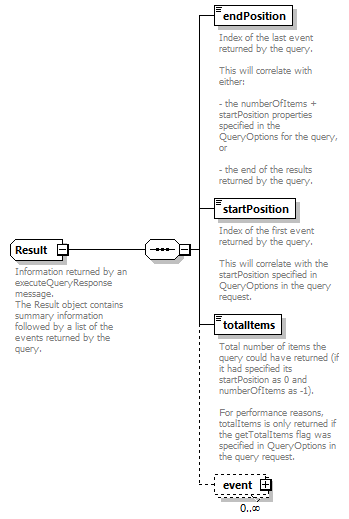 |
||
| namespace | http://base.api.ec.n2.tibco.com | ||
| children | endPosition startPosition totalItems event | ||
| used by |
|
||
| annotation |
|
||
| source | <xs:complexType name="Result"> <xs:annotation> <xs:documentation>Information returned by an executeQueryResponse message. The Result object contains summary information followed by a list of the events returned by the query.</xs:documentation> </xs:annotation> <xs:sequence> <xs:element name="endPosition" type="xs:int" minOccurs="1" maxOccurs="1"> <xs:annotation> <xs:documentation>Index of the last event returned by the query. This will correlate with either: - the numberOfItems + startPosition properties specified in the QueryOptions for the query, or - the end of the results returned by the query.</xs:documentation> </xs:annotation> </xs:element> <xs:element name="startPosition" type="xs:int" minOccurs="1" maxOccurs="1"> <xs:annotation> <xs:documentation>Index of the first event returned by the query. This will correlate with the startPosition specified in QueryOptions in the query request.</xs:documentation> </xs:annotation> </xs:element> <xs:element name="totalItems" type="xs:long" minOccurs="1" maxOccurs="1"> <xs:annotation> <xs:documentation>Total number of items the query could have returned (if it had specified its startPosition as 0 and numberOfItems as -1). For performance reasons, totalItems is only returned if the getTotalItems flag was specified in QueryOptions in the query request.</xs:documentation> </xs:annotation> </xs:element> <xs:element name="event" type="Event" minOccurs="0" maxOccurs="unbounded"/> </xs:sequence> </xs:complexType> |
element Result/endPosition
| diagram | 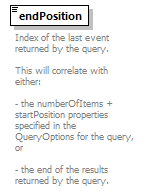 |
||
| type | xs:int | ||
| properties |
|
||
| annotation |
|
||
| source | <xs:element name="endPosition" type="xs:int" minOccurs="1" maxOccurs="1"> <xs:annotation> <xs:documentation>Index of the last event returned by the query. This will correlate with either: - the numberOfItems + startPosition properties specified in the QueryOptions for the query, or - the end of the results returned by the query.</xs:documentation> </xs:annotation> </xs:element> |
element Result/startPosition
| diagram | 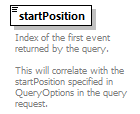 |
||
| type | xs:int | ||
| properties |
|
||
| annotation |
|
||
| source | <xs:element name="startPosition" type="xs:int" minOccurs="1" maxOccurs="1"> <xs:annotation> <xs:documentation>Index of the first event returned by the query. This will correlate with the startPosition specified in QueryOptions in the query request.</xs:documentation> </xs:annotation> </xs:element> |
element Result/totalItems
| diagram | 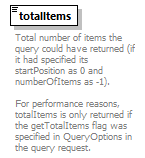 |
||
| type | xs:long | ||
| properties |
|
||
| annotation |
|
||
| source | <xs:element name="totalItems" type="xs:long" minOccurs="1" maxOccurs="1"> <xs:annotation> <xs:documentation>Total number of items the query could have returned (if it had specified its startPosition as 0 and numberOfItems as -1). For performance reasons, totalItems is only returned if the getTotalItems flag was specified in QueryOptions in the query request.</xs:documentation> </xs:annotation> </xs:element> |
element Result/event
| diagram | 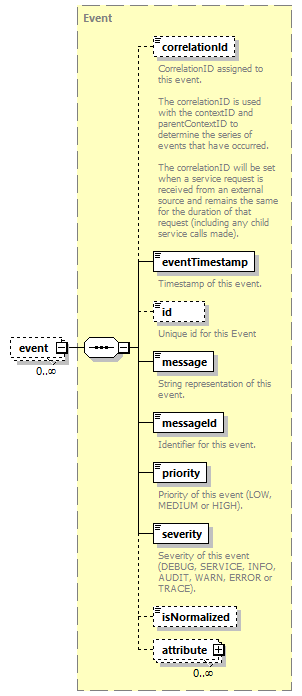 |
||||||
| type | Event | ||||||
| properties |
|
||||||
| children | correlationId eventTimestamp id message messageId priority severity isNormalized attribute | ||||||
| source | <xs:element name="event" type="Event" minOccurs="0" maxOccurs="unbounded"/> |
WSDL documentation generated by XMLSpy WSDL Editor http://www.altova.com/xmlspy